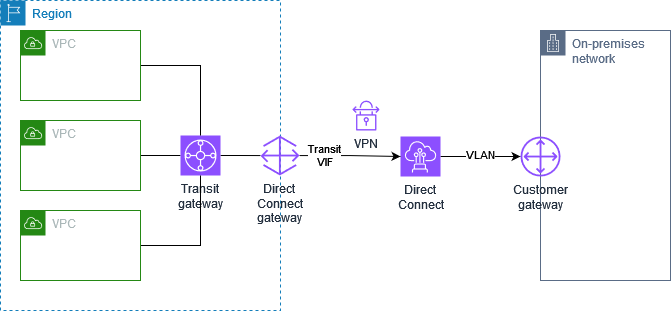Introduction

Image: blogs.perficient.com
In today’s interconnected world, organizations increasingly rely on private networks to securely communicate and share resources across remote locations. Site-to-site virtual private networks (VPNs) play a pivotal role in this connectivity, enabling businesses to extend their private networks over the public internet while maintaining the same level of security and privacy as a physical connection. Amazon Web Services (AWS) offers a robust suite of services for establishing and managing site-to-site VPNs, providing organizations with a seamless and cost-effective solution for connecting their on-premises data centers and cloud environments.
Understanding Site-to-Site VPNs and their Benefits
A site-to-site VPN establishes a secure, encrypted tunnel between two or more separate networks over the public internet, allowing users to transmit data as if they were directly connected. AWS’s site-to-site VPN services offer several notable benefits:
- Enhanced Security: VPNs encrypt transmitted data, protecting it from unauthorized access and eavesdropping, even on public networks.
- Cost Savings: Utilizing VPNs can eliminate the need for expensive leased lines or dedicated connections, reducing overall communication costs.
- Improved Network Flexibility: VPNs allow dynamic and flexible connectivity between networks, making it easier to connect geographically dispersed sites or cloud resources.
- Increased Reliability: AWS’s site-to-site VPNs offer high availability and fault tolerance, ensuring reliable network connectivity even during outages or disruptions.
Types of AWS Site-to-Site VPNs
AWS supports multiple types of site-to-site VPNs, each with its own strengths and applications:
- IPsec VPNs: Widely used, IPsec VPNs establish secure tunnels using the Internet Protocol security (IPsec) protocol, providing strong encryption and authentication capabilities.
- IKEv2 VPNs: Designed for mobile and remote access, IKEv2 VPNs offer faster and more stable connections than IPsec VPNs, making them ideal for devices frequently switching between networks.
- OpenVPN VPNs: Known for its open-source nature and flexibility, OpenVPN supports various encryption and authentication protocols, providing a customizable and secure VPN solution.
Planning and Configuring Site-to-Site VPNs on AWS
Before setting up a site-to-site VPN on AWS, it’s crucial to plan the network architecture and identify the specific requirements, such as the network topology, security protocols, and bandwidth allocation. AWS provides detailed documentation and resources to guide the process:
- AWS Management Console: AWS offers an intuitive web-based management console that simplifies the setup and configuration of site-to-site VPNs.
- AWS CLI: The AWS Command Line Interface (CLI) enables automation and programmatic management of AWS services, including VPN configuration and maintenance.
- AWS CloudFormation: CloudFormation allows for automated infrastructure provisioning, enabling the comprehensive deployment of site-to-site VPNs and supporting resources through pre-defined templates.
Best Practices for Secure Site-to-Site VPNs on AWS
Ensuring the security of site-to-site VPNs is paramount. Best practices include:
- Strong Encryption Algorithms: Use robust encryption algorithms like AES-256 or ChaCha20-Poly1305 to protect data in transit.
- Regular Security Audits: Conduct periodic security audits to identify vulnerabilities and address potential threats proactively.
- Multi-Factor Authentication: Implement multi-factor authentication for VPN access control, adding an extra layer of security beyond usernames and passwords.
- Regular Security Patching: Promptly apply security patches and updates to VPN gateways and supporting components to address potential security flaws.
Conclusion
Site-to-site VPNs are an essential tool for securely connecting networks across the internet. AWS provides a comprehensive suite of services to establish and manage site-to-site VPNs, offering flexibility, cost-effectiveness, and high security. By understanding the fundamentals and following best practices, organizations can leverage AWS’s VPN services to safeguard their private networks and facilitate seamless communication.

Image: getstarted.awsworkshop.io
Site To Site Vpn Aws







